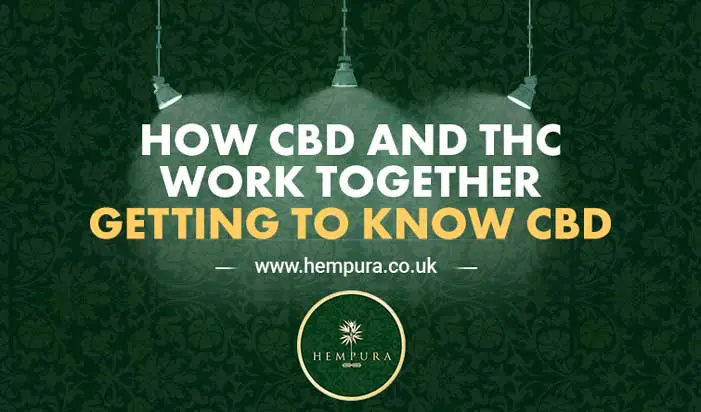CBD and THC are both found in cannabis. It’s thought that these two cannabinoids, plus the other cannabinoids found in cannabis, combine to have a unique effect that is more than the sum of their parts.
However, this effect hasn’t been fully studied and we don’t completely understand it. That’s because there are more than a hundred cannabinoids that have been isolated to date. What we do know is that CBD lessens the effect of THC by binding to the same receptors, not leaving room for the compound that gets you high. As for how THC strengthens or weakens the effect of CBD? That’s not known.
Besides, CBD and THC are not the only things found in cannabis that have an effect on you. They are just two of more than a hundred different cannabinoids, each of which may affect the body in a particular way.
How Does CBD Affect THC?
The exact ways that CBD and THC interact are unclear. Until recently, cannabis and cannabis products aside from hemp were illegal throughout almost all first world countries. It’s only in the past few years that medicinal and recreational cannabis have been legalised in certain places.
As such, the exact ways in which cannabinoids work isn’t as well understood as it could be. One of the most glaring examples of this problem in action are synthetic cannabinoids like Spice, which has become a major problem in the towns and cities of the U.K.
Spice is a synthetic cannabinoid, one of many similar products. Specifically, it’s designed to have the same effect as THC. In a way, it does—it gets you ‘high’. But its effects are far more severe than that of natural THC.
The same applies to Marinol, a synthetic form of THC which has been available for even longer. Marinol is reportedly a good appetite stimulant, like marijuana, but has an even stronger side effect of paranoia than regular THC.
This attempt to create a similar but synthetic compound comparable to THC is symbolic of how little we understand cannabinoids. By creating compounds that are functionally similar, we can broadly recreate THC’s effects; but there seems to be something about the interaction between cannabinoids which is more than the sum of their parts.
One thing that’s for sure is that CBD does interact with THC—and here’s how.
CBD Modulates THC’s Effects
Both CBD and THC are cannabinoids, i.e. compounds found in the cannabis plant and some related species. They interact with the body’s endocannabinoid system, which was only discovered in the 1990s; it’s thought that it may regulate mood, immune function and more (although scientists can’t say for sure).
When cannabinoids are ingested, they attach themselves to the body’s endocannabinoid receptors. Because both CBD and THC are cannabinoids, they compete to attach themselves to the same receptors. This means that there are fewer receptors for the THC compounds to attach themselves to.
What does this mean in practise? It means that there won’t be as much THC affecting your system, even though you ingest the same amount. This effect is borne out in anecdotal evidence, too. People who use marijuana recreationally state that strains with higher levels of CBD have a more rounded effect than those that have much more THC than CBD.
Why Don’t We Know More About CBD and THC?
Unfortunately, neither CBD nor THC have been rigorously studied to determine what positive effects, if any, they may have. While CBD is advertised by some unscrupulous companies that claim it’s a cure-all, scientific study has yet to back them up.
This is why CBD is only legally allowed to be marketed as a food supplement, not as a medicine.
Either way, the main reason we don’t know more about the effects of CBD and THC is this lack of study. And in turn, these cannabis products haven’t been extensively studied because of their legal status.
It is possible to acquire cannabis for use in scientific studies, but only if you jump through lots of hoops. And when cannabis products are studied, it’s usually to learn more about the effects of smoking marijuana, not what good they can do.
Can You Get CBD Oil with THC In It?
There are several different kinds of CBD oil available to the British market. The most popular are full-spectrum and broad-spectrum CBD oils.
Full-spectrum CBD oil is the result of the winterisation and filtering process. Nothing further is done to the oil to remove anything from it. As a result, it contains lots of different cannabinoids, as well as plant matter like chlorophyll and terpenes. This remaining plant matter gives the oil its characteristic green colour.
Broad-spectrum CBD oil is the result of taking this oil and further refining it. Plant matter is removed, which means that it’s a light gold in colour rather than green. But it still contains lots of different cannabinoids, which all interact with one another to produce CBD oil’s unique effect.
Aside from that, you can also purchase CBD isolate. This is less popular because CBD oil’s effects rely in part, at least, on the interplay between different cannabinoids—not just on cannabidiol itself.
But despite there being so many varieties of oil, none of them contain more than trace amounts of THC.
That’s because THC is currently illegal here in the U.K. Any product containing more than trace amounts of THC cannot legally be brought to market.
As such, CBD oil manufacturers use hemp to create their oil. Hemp contains lots and lots of CBD, but hardly any THC. That’s why it’s legal to grow and use hemp, but not other kinds of cannabis. Without THC, hemp cannot be smoked or otherwise ingested recreationally.
Last Updated on 08/06/2023





